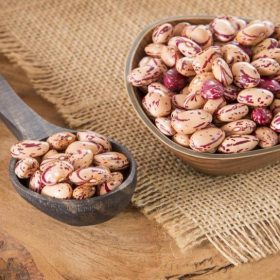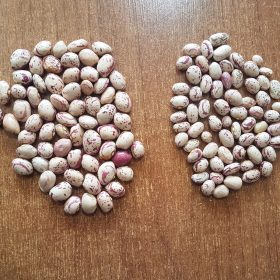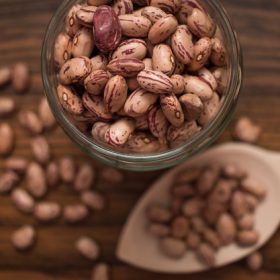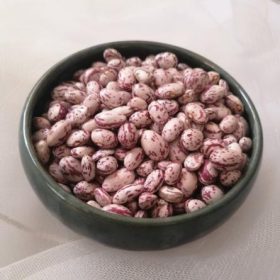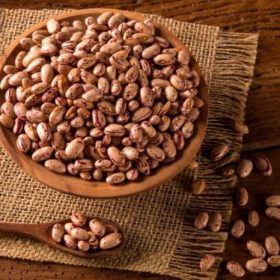
Product information and guide
What are pinto beans?
Pinto beans are one of the most popular and widely consumed types of beans in Iran and many other countries. Known for their distinctive appearance with white beans with brown or red spots, these beans are used in many traditional and modern dishes. Since pinto beans are rich in vegetable protein, fiber, iron, and other nutrients, they are considered a major source of nutrition in many diets.
Pinto beans are a good option for those who suffer from digestive problems because they are easier to digest than other types of beans. This product also has anti-inflammatory and antioxidant properties that help maintain health. Many consumers prefer them because of their mild taste and adaptability to a variety of foods.
How are pinto beans cultivated and harvested?
Pinto beans are cultivated in different regions of Iran, especially in areas with a temperate and dry climate. Due to its high resistance to drought, this plant is able to grow in lands with low water supply, but regular and proper irrigation is essential to obtain a high-quality crop. First, pinto bean seeds are sown in prepared lands with well-ventilated soil. These seeds are usually sown in late spring and early summer so that they can reach sufficient heat in the summer to grow.
Pinto beans are harvested when the plant is fully mature and the seeds have dried. Typically, this process occurs in late summer and early autumn. After harvesting, pinto beans must be dried in suitable conditions to prevent spoilage and loss of quality. Finally, the beans are packaged and prepared for consumption or sale.
What are the characteristics of quality pinto beans?
Quality pinto beans have several specific characteristics that can be easily distinguished from poor-quality beans. The first characteristic of quality pinto beans is their uniform color and no spots. The beans should be white with regular light brown spots, while any discoloration or dark spots can indicate spoilage or poor quality.
In addition to color, quality pinto beans should be firm and uncracked. Broken or soft beans indicate spoilage or long time since harvest. Another important characteristic of quality pinto beans is their moisture level. Quality beans usually have low moisture content, which increases shelf life and prevents mold. Proper packaging is another factor that determines the quality of pinto beans.
Which provinces in Iran are the largest producers of pinto beans?
In Iran, several provinces are known as major producers of pinto beans. Isfahan, Fars, and Lorestan provinces are among the largest producers of pinto beans in the country. Isfahan province is one of the main areas for pinto bean cultivation due to its fertile land and adequate water resources. This province produces large quantities of high-quality pinto beans annually.
Fars Province is also known as another major producer of pinto beans. Especially in the eastern and northern regions of this province, there are extensive fields where pinto beans are grown. Also, Lorestan Province, which is known for its suitable climatic conditions for growing various legumes, has a significant share in pinto bean production in Iran.
The Best Way to Cook Pinto Beans
Cooking pinto beans requires some care in order to prepare them in the best way. Here are some effective ways to cook pinto beans:
1. Washing and Soaking Pinto Beans: Before cooking pinto beans, they should be washed well and cleaned of any dirt and contamination. Then, soak the beans in cold water for 6-8 hours. This will not only reduce the cooking time, but also help improve digestion and reduce bloating.
2. Quick cooking using a pressure cooker: One of the best ways to cook pinto beans is to use a pressure cooker. In this method, after soaking the beans, add them to the pressure cooker and cook with the right amount of water for 20-30 minutes. This method is very fast and efficient.
3. Traditional cooking: If you are not using a pressure cooker, you can cook the beans in a pot with enough water over low heat. This method may take longer, about 1-1.5 hours. It is better to add salt to the beans halfway through cooking to prevent them from hardening.
4. Using spices and vegetables: To improve the taste of pinto beans, you can use various spices such as saffron, pepper, cinnamon or aromatic vegetables such as coriander and parsley. This not only enriches the taste of the food, but also increases its properties.
Benefits and Economic Justification of Bulk Purchase of Pinto Beans for Stores and Workshops
Purchasing pinto beans in bulk for stores and workshops has significant economic benefits. The first advantage is the reduction in costs due to purchasing at lower prices. When purchasing in bulk, sellers usually offer discounts that can reduce the final price of the product and increase profits.
In addition, purchasing pinto beans in bulk provides security of supply of raw materials for production workshops that need this product on an ongoing basis. In times when demand increases or the market is faced with a shortage, storing pinto beans in bulk can ensure that production continues without interruption. This is not only economically beneficial for the workshops, but also satisfies customers.
Summary
Chickpeas are known as one of the most popular legumes in Iran and many parts of the world. This product is used in many everyday dishes with its unique features, including mild taste and easy digestion. Iran, as one of the major producers of chickpeas in the region, has introduced provinces such as Isfahan, Fars and Lorestan as its main production hubs. Cooking these beans is also possible using various methods such as soaking, pressure cooking and traditional cooking. On the other hand, buying chickpeas in bulk brings many economic benefits to businesses due to cost savings and continuous supply of raw materials.
To read the full text of Ehsan Baghban's business introduction letter, click on the button below.
To read the full text of "Why You Should Choose Ehsan Baghban Trading", click on the button below.
Buy in bulk
Terms of purchase of this product
To read the full text of our cooperation proposal, click on the button below.
Ways to contact us and get advice
If you need advice, contact us at one of the following numbers:
1449
With Iran prefix +98
9122002000
With Iran prefix +98
9125000500
With Iran prefix +98
9126006000
With Iran prefix +98


